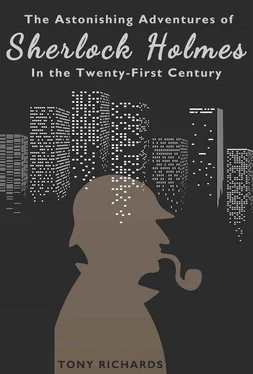“But what can you possibly mean, M’sieu Holmes? How can someone be both ‘there’ and ‘not there’.”
Holmes chose the route for them, heading in an easterly direction, closing in upon the Seine.
“Are you much of a student of philosophy, inspector?”
Which got him a wordless and bug-eyed response.
“The German, Friedrich Nietzsche, once proposed this theory: that if the need for a new god is strong enough, if the longing for its existence is powerful and sincere enough, then that god might come into existence.”
They were crossing another street, getting nearer to the river. And Fontaine was still staring at the great detective like he’d gone insane.
“The things I’ve seen over the past few years lead me to believe that there might be some truth in that,” Holmes pointed out obliviously. “And if a god can be created that way, why not other types of being? Ones that everybody is familiar with, and yet were previously thought to exist only in the imagination.”
They were beside the river now, and heading up towards an ornate bridge.
“What was required in these cases was not a god exactly, good Fontaine, but – to use Marie Le Pays’ precise word – a saviour.”
“A—?”
“Think of it!” Holmes insisted. “That sad, under-aged runaway, assaulted by a violent pimp who was about to use a razor on her. Those unfortunate Ukrainian girls, tricked here with the prospect of a better life and then finding themselves in a seedy hotel room, in imminent danger. And that unknown woman on the towpath of this very river, struggling in the lecherous clutches of the brutish LeClochet. How great their need? How powerful their longing to be saved? And theirs cannot be the only stories, in a city of this size. How many thousands more oppressed women cry out, in the terrified depths of their hearts, for some almighty saviour?”
They had walked across the short bridge, and were heading down the quiet, deserted central street of the Île de la Cité. And Fontaine was now peering at Holmes curiously, blinking slowly. Beginning to see the sense of this, but still unsure of what the Englishman was driving at.
“And so one has come into existence,” Holmes explained. “One that we are all familiar with – Paris’ most famous rescuer of any woman. The man who would have given his life and his very soul to have saved his beloved Esmerelda.”
And the two detectives came to a halt in front of the darkly magnificent bulk of Notre Dame Cathedral.
“Yes, the Hunchback himself has returned to Paris,” Sherlock whispered.
Fontaine’s mouth dropped open and his cheeks turned red.
“But, m’sieu, that is only a work of fiction.”
“Until now,” Holmes smiled.
And he stepped across, tipped back his head. And then he yelled out.
“Quasimodo ? ”
Sure enough, the shadows to the side of one spire moved. And then a human figure parted company from the general mass of darkness. Fontaine could only make it out in silhouette, but it was massive and crouched over. And he knew it was the same one that they’d been pursuing in the helicopter.
The inspector was thunderstruck. His frame went rigid and his face was drained of blood. And for a while, it looked like he’d stopped breathing. But then he forced himself to draw in a lungful of air, and attempted to compose himself.
He managed it only partially, and still looked very flustered.
“But, m’sieu,” he blurted, turning to Holmes, “what am I to do? I am a sworn officer of the law, so how do I resolve this?”
“You could go up there and try to arrest him, I suppose,” Holmes said. “I doubt, despite his great strength, he would do you any harm. But you saw what happened on the rooftops when we cornered him. He’s not a normal man in that respect.”
Fontaine shook his head, bemused.
“Then what?”
“It’s not my business to tell you how to do your job,” Holmes answered dryly. “But can I ask you a question? I see that you are married. And I take it that you have a family?”
The inspector straightened. “Indeed. I have three beautiful daughters, the eldest of whom is studying at the Sorbonne. They are the light of my life, sir, my greatest pride and joy.”
At which, Holmes’ expression became practically droll.
“Then might I suggest that they could walk these streets more safely with the fellow up there watching over them?”
Fontaine took a while absorbing what was being proposed. But when he’d finally worked his mind around it, his own demeanour became vaguely humorous, a gleam of irony appearing in his eyes.
“You know what, M’sieu Holmes?” he offered. “All these supernatural events? They seem to have had a strange effect on me. I have suddenly become clairvoyant, and can see a good long way into the future. And can confidently predict that this case, and others like it in the years to come … they will never be solved.”
Holmes beamed back at him. And then Fontaine returned his attention to the huge, crouched figure on the ramparts.
He had gone stiff as a ramrod, and he raised his right hand to his forehead in a swift, precise salute.
“It is not au revoir then, M’sieu ‘unchback!” he called up. “It is adieu! Et merci! And good hunting, mon vieux!”
Holmes nodded approvingly at that.
And then, without another word, the two men turned around and walked away. They made no further comment on the matter, and neither of them – not for the tiniest instant – made the slightest attempt to look back.
They were in sore need of refreshment after their exertions. And Fontaine, naturally, knew of an excellent little café nearby.
The air around them was mild and sweet smelling. The murmur of the city’s traffic seemed extremely distant. And Holmes believed that he could hear a nightingale singing close by.
Ah , he thought happily, what is there that could ever be the match of such a fine evening in Paris?
So at last he was back in London. He had been avoiding a visit for quite a considerable while now, since the whole atmosphere of the place, in its modern incarnation, discomforted him somewhat.
He had spent a good long while here during the course of the Second World War, helping the government in any way he could on matters of espionage, intelligence-gathering and analysis. His keenly honed intellect, his insights into human nature and his huge skills as a master of disguise had been especially useful in that regard.
But those adventures had come to a close before the middle of the 20th Century, and things had changed in London town an awful lot since then. Large parts of the city barely looked the same as they had done in his time. And yes, the Blitz had been in good measure responsible for that. But the way that some areas had been rebuilt was nothing short of shocking. And it wasn’t that he disliked every single style of modern architecture. He was rather keen on that fantastic Ferris wheel down by the River Thames that went by the name of the ‘London Eye’, and had ridden on it several times. And there was a tower of glass and steel – nicknamed ‘The Gherkin’ – which he thought of as quite wonderful and pleasing to the eye.
Too much of his beloved home, however, had been given over to great featureless and soulless slabs of concrete, and it hurt his pride to see it. Shakespeare had once written that the first thing people ought to do was ‘hang all the lawyers’. Perhaps the better candidates for a swift lynching these days were the architects?
And then there was the manner in which the people of this great metropolis presently dressed and comported themselves. Barely anybody who was not compelled to do so by his job wore a proper suit and tie any longer. Bowler hats and rolled umbrellas had been consigned to the same distant chapter of history as the triceratops. He was standing on one of the most expensive shopping streets in the whole city, and the only thing that he could see around him was casual dress.
Читать дальше












